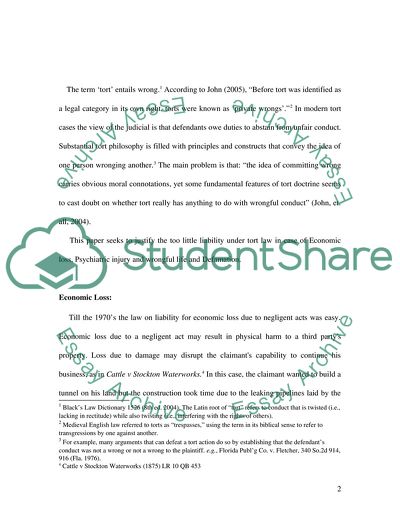Cite this document
(The Effect of the House of Lords Judgment in Ruxley Electronics and Essay, n.d.)
The Effect of the House of Lords Judgment in Ruxley Electronics and Essay. Retrieved from https://studentshare.org/law/1736631-to-what-extent-does-english-tort-law-impose-too-much-liability-to-what-extent-does-it-impose-too-little-liability-discuss-at-least-three-distinct-areas-of-tort-law-eg-economic-losspsychiatric-injury-wrongful-life-duty-of-care-etc-and-include-r
The Effect of the House of Lords Judgment in Ruxley Electronics and Essay. Retrieved from https://studentshare.org/law/1736631-to-what-extent-does-english-tort-law-impose-too-much-liability-to-what-extent-does-it-impose-too-little-liability-discuss-at-least-three-distinct-areas-of-tort-law-eg-economic-losspsychiatric-injury-wrongful-life-duty-of-care-etc-and-include-r
(The Effect of the House of Lords Judgment in Ruxley Electronics and Essay)
The Effect of the House of Lords Judgment in Ruxley Electronics and Essay. https://studentshare.org/law/1736631-to-what-extent-does-english-tort-law-impose-too-much-liability-to-what-extent-does-it-impose-too-little-liability-discuss-at-least-three-distinct-areas-of-tort-law-eg-economic-losspsychiatric-injury-wrongful-life-duty-of-care-etc-and-include-r.
The Effect of the House of Lords Judgment in Ruxley Electronics and Essay. https://studentshare.org/law/1736631-to-what-extent-does-english-tort-law-impose-too-much-liability-to-what-extent-does-it-impose-too-little-liability-discuss-at-least-three-distinct-areas-of-tort-law-eg-economic-losspsychiatric-injury-wrongful-life-duty-of-care-etc-and-include-r.
“The Effect of the House of Lords Judgment in Ruxley Electronics and Essay”, n.d. https://studentshare.org/law/1736631-to-what-extent-does-english-tort-law-impose-too-much-liability-to-what-extent-does-it-impose-too-little-liability-discuss-at-least-three-distinct-areas-of-tort-law-eg-economic-losspsychiatric-injury-wrongful-life-duty-of-care-etc-and-include-r.


